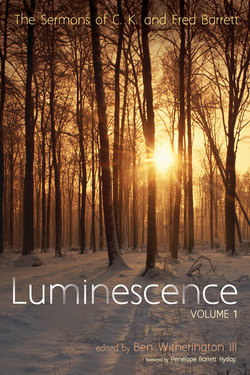Читать книгу Luminescence, Volume 1 - C. K. Barrett - Страница 25
На сайте Литреса книга снята с продажи.
“THE FEAST”—Matthew 22.1–10
Оглавление[Preached once, on 10/18/53 as a homily for an ecumenical Communion service—the Free Church Societies’ Communion, Durham Congregational]
I need not use more than one of my precious minutes in recalling to you the outline of the story. A great man made a great feast. A number of people had had invitations long in advance, and when the feast was ready a servant was sent round to tell them so, and bid them come. But it was a long time since the invitation was given, and they had lost interest in it, so they all excused themselves. All the excuses were fundamentally the same: land, oxen, a wife, were all more interesting, important, and pleasurable than the feast. So the King who had made the feast duly punished his invited guests, who had murdered his messengers. More messengers were sent out to find new guests, and the banqueting hall was filled with the ragtag and bobtail of the streets.
We generally read the parable as a vivid representation of the Gospel, and take to ourselves no small comfort therefrom. We think of the goodness of God in calling us to his heavenly feast, the feast that is anticipated on earth in the life of faith and is especially concentrated into this monumental meal, the outcast and the despised, and conclude that therefore there is life even for ourselves.
We are right in this—the parable is a preaching of the Gospel. The good news of God’s love for the undeserving. But perhaps we are wrong in the place we find ourselves in the story. I suppose that when Jesus told this story, he had in mind, in the first instance, the Jewish authorities, and especially the Jewish pietists—the Pharisees, men who supposed, and did not suppose wrongly, that of all persons they might expect invitations to the Kingdom of God, and on the other hand, the people of the land, careless, untaught, irreligious by the best standards and unclean according to the Law.
Now if we were to transplant the parable to England in 1953, we must see where we come in. We primarily are the privileged; we are the intellectual aristocracy; we have lived in good homes and had good schools; we have been brought up in the Church; we are full of good works and activities of one kind or another. We are the people who murder God’s emissaries and rank our own affairs above, not his work (we are very busy with that) but above his feast. Is this not true? Are we, the religious backbone of the country, not so busy doing God’s work for him that we forget that we are at best his guests, recipients of his bounty? Aren’t we more like the hired servants than the prodigal son?
Of course I have deliberately over-simplified in order to counter another over-simplification. In fact, the only way to understand this parable is the dialectical way. Jesus didn’t mean that God called sinners into his Kingdom only by a sudden happy after-thought. What sort of God would a God who did that be? We are both; and we can only come rightly to this sacrament as we recognize that—gratefully thanking God for our privileges, penitent for our abuses of the privileges and especially of the dying love of Christ; and recognizing that we are at our best, poor, weak, lame, dirty beggars who may yet come to be fed at the King’s board.
